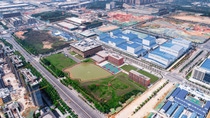Media
BASF expands production capacity in China for industry-leading cathode active materials and achieves multi-ton scale manufacturing for manganese-rich products
- Newly expanded lines incorporate cutting-edge energy recovery technology for a leading carbon footprint
- Commissioning of new capacity will start from Q4 2022 to support growing market demand
BASF Shanshan Battery Materials Co., Ltd. (BSBM), a BASF majority-owned company in China (BASF 51%; Shanshan 49%), is expanding its battery materials capacity in Changsha, Hunan Province, and Shuizuishan, Ningxia Province, to meet the fast-growing local and global demands of the electric vehicle (EV) industry. The expansion project will enable BSBM to achieve 100 kt annual capacity for cathode active materials (CAM).
The new production lines are designed with high flexibility to produce an advanced product portfolio and meet customers’ diversified needs, from high-nickel and ultra-high-nickel nickel-cobalt-manganese oxide (NCM) for polycrystalline and single crystalline, as well as manganese-rich NCM products.
The manganese-rich products are already manufactured on a multi-ton scale. This progress in material development will be further accelerated, thus broadening the use of such products by customers.
“Our manganese-rich products are well balanced in cost-performance compared to other ternary cathode materials and offer customers a higher security on lower metal cost as manganese is the most abundantly available metal compared to cobalt or nickel, which have recently been subject to significant price increases and fluctuations,” said Dr. Peter Schuhmacher, President, Catalysts division at BASF.
The new lines are equipped with innovative energy recovery technologies including off-gas, waste heat and oxygen recycling. This is the first time that such technologies have been used in the battery industry and combine BSBM’s broad industrial operation experience with BASF’s chemical process design know-how.
“With the synergy on technology expertise in R&D and production, we are glad to see that BASF’s chemical know-how will be a catalyst to contribute to a more sustainable CAM offering with an industry-leading carbon footprint,” added Dr. Michael Baier, Senior Vice President of BASF Battery Materials and Chairman of the Board of BSBM.
Embedding the Smart Factory concept for automated, intelligent and sustainable plants, the expansion projects have implemented industry-leading standards in process design, production environment management and dust control to meet the critical qualification requirements in the battery materials industry and at the same time enable high throughput with outstanding quality.
“We have been continuously upgrading BSBM’s manufacturing and environmental protection facilities to meet world-class standards,” said Jay Yang, CEO of BSBM. “We are continuing to execute our company’s commitment to our customers and employees to make BSBM a more environmentally friendly and responsible CAM producer.”
The commissioning of the new lines will start from the fourth quarter of 2022.
To learn more about BASF battery materials and BASF’s commitment to e-mobility, visit our website:
https://catalysts.basf.com/products-and-industries/battery-materials
About BASF’s Catalysts Division
BASF’s Catalysts division is the world’s leading supplier of environmental and process catalysts. The group offers exceptional expertise in the development of technologies that protect the air we breathe, produce the fuels that power our world and ensure efficient production of a wide variety of chemicals, plastics and other products, including advanced battery materials. By leveraging our industry-leading R&D platforms, passion for innovation and deep knowledge of precious and base metals, BASF’s Catalysts division develops unique, proprietary solutions that drive customer success. Further information on BASF’s Catalysts division is available on the Internet at www.catalysts.basf.com.
About BASF
At BASF, we create chemistry for a sustainable future. We combine economic success with environmental protection and social responsibility. Around 111,000 employees in the BASF Group contribute to the success of our customers in nearly all sectors and almost every country in the world. Our portfolio comprises six segments: Chemicals, Materials, Industrial Solutions, Surface Technologies, Nutrition & Care and Agricultural Solutions. BASF generated sales of €78.6 billion in 2021. BASF shares are traded on the stock exchange in Frankfurt (BAS) and as American Depositary Receipts (BASFY) in the U.S. Further information at www.basf.com.
P-22-253


